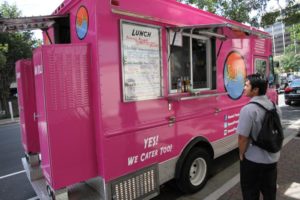 Food truck owners are declaring victory after a successful showdown over a street vending ordinance in Arlington General District Court.
Food truck owners are declaring victory after a successful showdown over a street vending ordinance in Arlington General District Court.
Currently, under Arlington County Code 30-9, food trucks are prohibited from vending on a public street for more than an hour in one spot. The enforcement of that portion of the Arlington County Code led to an outcry among food truck owners, who say it unfairly targets their business in order to protect brick-and-mortar restaurants.
Late last year, the Institute for Justice, an Arlington-based libertarian law firm, announced that it was taking up the case of Arlington food trucks as part of its National Street Vending Initiative, which seeks to break down legal barriers for street vendors. Today, that effort bore fruit.
 An Arlington County judge, at the request of prosecutors from the Commonwealth’s Attorney’s office, dismissed a loitering charge against Hyun “Anna” Shil Goree, co-owner of the Seoul Food truck. Goree was charged with the crime — a Class 1 misdemeanor punishable by up to a year in jail and a fine of up to $2,500 — after a police officer determined that she had not moved her truck “far enough” to comply with the law.
An Arlington County judge, at the request of prosecutors from the Commonwealth’s Attorney’s office, dismissed a loitering charge against Hyun “Anna” Shil Goree, co-owner of the Seoul Food truck. Goree was charged with the crime — a Class 1 misdemeanor punishable by up to a year in jail and a fine of up to $2,500 — after a police officer determined that she had not moved her truck “far enough” to comply with the law.
Last year Goree was fined $25 and $200 after pleading no contest to street vendor loitering charges in August and October. After being charged again in December, she decided to fight back, enlisting the help of the the Institute for Justice and the law firm of Gibson, Dunn, & Crutcher LLP. The charged was dismissed today via a nolle prosequi motion.
The Food Truck Association of Metropolitan Washington, which has spoken out against the Arlington ordinance, says the dismissal is a victory against an arbitrary law that’s “vague and open to different interpretations.”
“This case highlights the absurdity of treating what amounts to a parking violation as a crime on par with assault,” said Doug Povich, co-owner of Red Hook Lobster Pound truck and Chairman of the Food Truck Association. “The Food Truck Association hopes to work with the County in the months ahead to craft a food-truck law that serves the County’s residents and workers and keeps food trucks as a vibrant part of Arlington’s business community and streetscape.”
Arlington County spokeswoman Mary Curtius said the county is indeed working to change the ordinance.
“We realize that the 60-minute time limit is challenging for vendors and for customers, and we are working to change it,” Curtius said. “We hope to be bringing something forward in the Spring.”
No word yet on whether today’s action will set a precedent leading to the dismissal of other food truck loitering charges in Arlington.
The full press release from the Food Truck Association, after the jump.
File photos
An Arlington County judge today granted the Commonwealth’s Attorney’s motion to nolle prosequi in its case against the Korean fusion food truck Seoul Food, completely dismissing the case.
Anna Shil, who owns Seoul Food with her husband JP Goree, faced the possibility of up to a year in jail and a fine of $2,500. Her alleged crime? Not moving her truck “far enough.”
Seoul Food has been serving Arlington residents for the past year and a half. But in recent months the County began enforcing a provision in its law that forces food trucks to move every 60 minutes. Violating the anti-competitive restriction is a Class 1 misdemeanor, meaning that Arlington treats serving customers for 61 minutes as harshly as driving drunk or assault.
Worse yet, Arlington County’s law is vague and open to different interpretations. The law does not specify how far a food truck must move, only that it must “remain stopped for … no longer than sixty (60) minutes.” On three different occasions, three different Arlington officials gave Seoul Food three different explanations of how far their truck must move to comply with the law. Most recently, Shil moved the truck within the 60-minute period, but Arlington police still cited her because the officer felt that Seoul Food had not moved “far enough.”
With today’s dismissal, Shil can breathe easy knowing that she won’t go to jail for the crime of serving customers from her food truck.
“I’m happy this is behind us and we can focus back on making the food we love, serving our regulars and preparing to open our brick-and-mortar restaurant,” said Shil. “And I hope this case spurs the County to get rid of its 60-minute rule.”
Seoul Food is a member of the Food Truck Association of Metropolitan Washington, which has more than 50 members in Arlington and Washington, DC.
“This case highlights the absurdity of treating what amounts to a parking violation as a crime on par with assault,” said Doug Povich, Co-Owner of Red Hook Lobster Pound-DC and Chairman of the Food Truck Association of Metropolitan Washington.
“We have had good discussions with [Arlington Economic Development] and [the] County Board… to revise a law that just doesn’t make sense,” Povich said. “The Food Truck Association hopes to work with the County in the months ahead to craft a food-truck law that serves the County’ residents and workers and keeps food trucks as a vibrant part of Arlington’s business community and streetscape.”
Shil was represented in the case by attorneys in the Washington, DC office of Gibson, Dunn, & Crutcher LLP, a leading international law firm. Gibson Dunn attorneys Noah Sullivan, Michael Huston, Alex Harris, and Michael Diamant vigorously pursued Shil’s defense in order to secure the case’s dismissal. “We applaud the Commonwealth’s Attorney’s decision in this case and think it shows that they understand why this ordinance is problematic. A person cannot be prosecuted for a crime when the rules are vague, unclear, and conflicting,” said Noah Sullivan, one of Shil’s attorneys.
Also supporting Seoul Food was the Institute for Justice, which is based in Arlington.
“The Institute for Justice works to improve vending laws around the country, so when we heard about what was happening in our own backyard, we had to get involved,” said IJ attorney Robert Frommer. “Until recently, Arlington County has been lauded as a vending success story. We hope that the County will scrap its counterproductive 60-minute rule and let food trucks get back to what they do best: serving their customers.”







